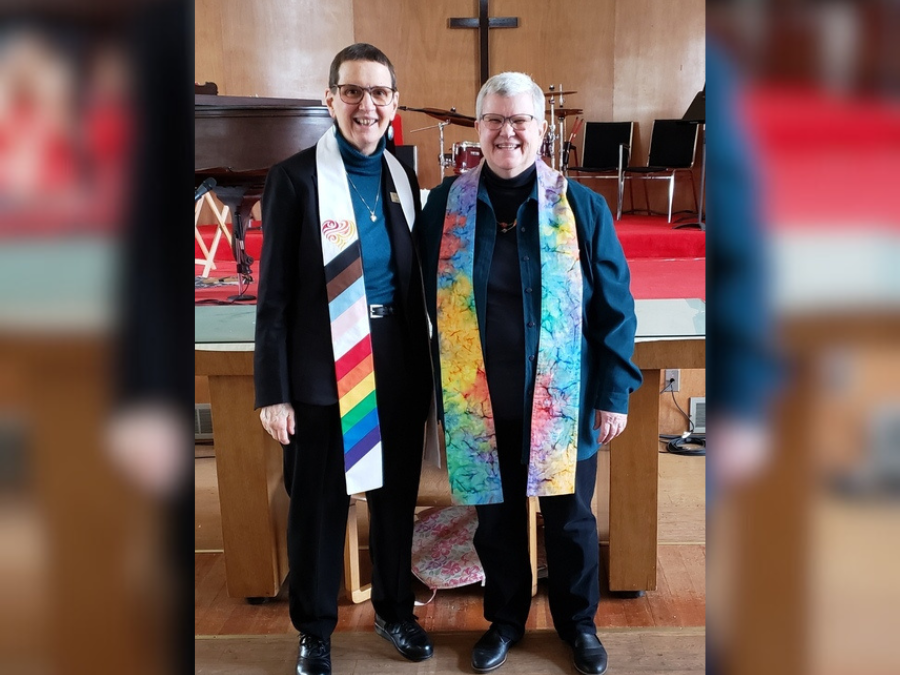Thirty years after surrendering her ordination for coming out as a lesbian, Rev. Martha Juillerat stood before Heartland Presbytery in Kansas City, Mo., on Feb. 25, and heard the words she’d waited decades for — an apology and the official restoration of her ministry.
“It just lifted the weight of the world off me to hear that,” says Juillerat. “I have been carrying the weight of that terrible time for 30 years, and to just hear that, I don’t have words for it to this day. I may never have words for it.”
You may unsubscribe from any of our newsletters at any time.
Juillerat and her spouse, Rev. Tammy Lindahl, are now serving in Victoria as United Church of Canada ministers, but were both ordained in the Presbyterian Church (U.S.A.) the 1980s, when the denomination was still barring “self-avowed, practicing homosexuals” from ordination. They met through a women-in-ministry support group and held a private holy union in 1988, with the only six people they were out to in attendance.
After Juillerat and Lindahl publicly came out years later, they faced near-total isolation from their congregations. But even before that turning point, the Presbyterian Church had begun to examine how it treated queer clergy.
In 1993, the denomination launched a series of “dialogues” on homosexuality and invited LGBTQ clergy to share their stories. Only three ministers from the central states stepped forward with Juillerat and Lindahl among them.
“The church asked gay people to come out and join the conversation, yet did nothing to protect our status,” Lindahl recalls. This sparse head count spurred Juillerat to launch the Shower of Stoles Project, urging closeted ministers to mail her a stole as silent testimony that the ministry of queer Presbyterians stretched far beyond those who were visible.
For the next two‑and‑a‑half years, the couple spent weekends in Missouri, Kansas, Iowa and Arkansas for the church‑sponsored dialogues. “It wasn’t even a debate,” Lindah says. “They were shouting matches.” Crowd hostility, hate mail and the occasional death threat became routine.
In 1995, the couple were serving as ministers in Kansas City. Expecting disciplinary charges after coming out publicly, Juillerat pre‑empted the process by “setting aside” her credentials.
“We made the mutual decision to come out publicly, and we knew that would be the end of our careers,” Lindahl explains.
After Lindahl publicly came out on the floor of the Presbyterian Church’s General Assembly, a member from outside of Twin Cities Presbytery — Lindahl’s presbytery— filed disciplinary charges and her ordination was formally revoked. She pivoted to social work, while Juillerat trained to become an auto mechanic.
“I know that for the church I was serving at that time, nobody in the church ever spoke to me again. I mean, it was pretty harsh. We expected that,” says Juillerat.
More on Broadview:
- Watch the moment a bishop begs Trump to ‘have mercy’ on 2SLGBTQ+ people, migrants
- Rural Newfoundland minister ousted from congregation for pro-2SLGBTQ+ stance
- I grew up in an evangelical church. Now I’m a 2SLQBTQ+ affirming minister.
In 2008, the couple moved to Canada, where they continued working outside of ministry.
Then in 2010, the Presbyterian Church’s General Assembly passed an amendment that lets each presbytery and session decide whether to ordain openly LGBTQ+ ministers, effectively leaving the choice to individual congregations, and in 2018, the 223rd General Assembly unanimously ruled that religious freedom can’t be used to deny anyone jobs based on their racial, sexual or gender identity.
When the denomination’s stance began to soften, Twin Cities — one of the most progressive presbyteries — opted not to put Lindahl through the formal reinstatement process. In 2017, they simply handed her qualifications back. Heartland Presbytery, the presbytery that ordained Juillerat, remained split on queer inclusion, leaving Juillerat’s status unresolved for decades.
“They’d been fighting those rules forever,” Juillerat says of Twin Cities. “So when the time came, they just handed Tammy her credentials back.”
In 2018, Lindahl transferred her ordination to The United Church of Canada.
By 2024, Juillerat was preaching regularly at Esquimalt United in Victoria, where Lindahl also continues to serve. Presbyterian rules tie ordination to a confirmed call, so Heartland Presbytery had to collaborate with the United Church to consider reinstatement. Juillerat insisted that any resolution include a formal apology.
And then, in Kansas City on Feb. 25, Heartland Presbytery held a service of reconciliation devoted to one purpose, formally apologizing to Juillerat and restoring her ministry. The shift in attitude was unmistakable. Rev. Dale Jackson — an out gay minister and now the Presbyter for Vision and Leadership at Heartland — delivered the formal apology. Friends who had supported Juillerat and Lindahl in the 1990s flew in to watch Jackson return Juillerat’s stole and declare the restoration of her ordination.
“You made a difference. I stand here today, a gay minister and leader of this presbytery, because of the bravery and commitment to inclusion you and others like you demonstrated,” Rev. Dale Jackson told her during the service.
Today, after decades of struggle and hard‑won change, Juillerat and Lindahl now serve side by side at Esquimalt United, continuing the ministry they once risked so much to keep alive.
“You know, my hope would be — although I know it’s not completely realistic — that there’ll come a day when no one has to go through what we had to go through,” Lindahl says.
The couple also knows their work is far from over. They credit the United Church with demonstrating the values of progressive Christianity in Canada.
“We need to keep being that voice for queer folks, especially trans folks, and we need to be that beacon of light to say ‘you’re welcome here.’ The church isn’t universally evil and fundamentalist and mean — there’s another side that is welcoming, affirming and actively on your side,” Juillerat says.
***
CORRECTION: A previous version of this story referred to Rev. Dale Jackson as the stated clerk of Heartland Presbytery. In fact, he is the Presbyter for Vision and Leadership. This version has been corrected.
Paniz Vedavarz is an intern at Broadview.















The Rev. Dale Jackson is actually the Prebyter for Vision and Leadership.
Our congregations in Bella Coola were privileged to have Tammy as our Minister for four years, including throughout Covid restrictions. It was her first as a “pulpit minister” — which is really only about 20% of the Ministry here. However, Martha came with the deal, when she could spend time here away from her social justice work for Randall Garrison, MP. And what a deal that was — she is one of most powerful preachers we’re ever likely to experience. We were very excited to celebrate her restoration of ordination, feeling that we had a personal stake in it. Esquimalt United is very fortunate to have them both.
John Morton, Bella Coola.